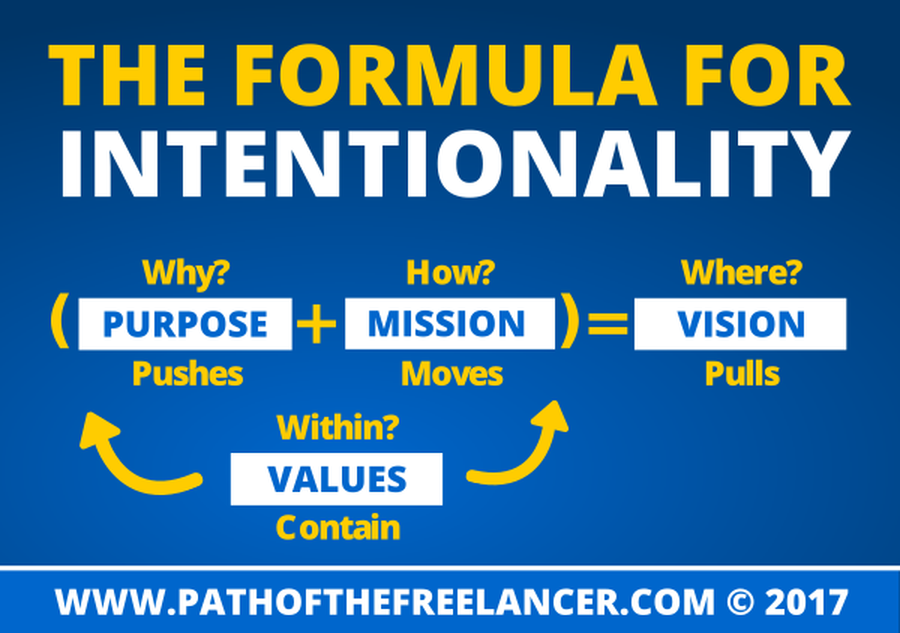You’ve heard the parable of the two builders. One builds on sand and another on bedrock. When a storm comes, the well-anchored house stands strong while the other is washed away.
No entrepreneur wants their business destroyed by the unexpected marketplace storms sure to test the strength of their company’s foundation. But, most entrepreneurs, excited by the potential of the solutions they plan to create, don’t spend the time upfront to answer several simple but highly important questions.
But you know your startup will be different. You’re going to choose intentionality, and I’m here to help you do it in the simplest way possible.
For years, I struggled to understand how to integrate vision, mission, values and purpose in my business. Which ones should I care about most heavily, and how do I go about creating these vital long-standing statements that will shape my company?
Unfortunately, an answer never materialized, and like the numerous startups launched to solve unresolved problems, I decided to hunker down, define these terms and provide a visual way to help myself navigate and anchor the intentions of my business.
Related: 4 Business Goals for First-Time Entrepreneurs
Enter, the formula for intentionality

Purpose (why?) + mission (how?) within our core values ultimately results in our vision (where?).
Let’s break it down.
Purpose
Our starting point for our startup is purpose. Why does our startup exist? With purpose, we have energy to launch our idea and we have a strong reason to get out of bed each morning.
Let me share an example of purpose from my former marketing company:
Be an example of excellence and accountability.
This was why my company existed.
As you see, in this case, the purpose was primarily internal. It dictated how we operated and encapsulated our strongest beliefs. With your purpose statement, you want to concisely capture the why behind it all.
So, why does your startup exist?
Mission
Let’s talk about mission. Mission is our how. It’s the general path our business will take to get to the destination. Mission moves us, our team and our organization forward. And we have numerous options with mission. When you think about traveling from New York to Mexico, there are different paths and vehicles to get there. Which one will your business take?
For example, my marketing company’s mission was to obliterate marketing neglect. Makes sense for a marketing company, right?
When we were prospecting, discovering a project or working with a customer, our mindset was to look for this neglect and offer solutions to shore it up. It’s how we mobilized the team, prospects and clients. And, there is marketing neglect everywhere (including within our own organization). We never lacked opportunities.
So, what is your startup’s mission statement?
Core values
These are the boundaries we operate within. Think of a circle, and values are the edge of that circle that help us feel or know when we’re out of bounds in how we’re operating. Maintaining values provide long-term benefits for building a sustainable and long-lasting business.
Values are also essential for building a powerful startup culture that sustains growth. Our guiding values included passion, respect, service, growth and ideation.
Every combination and order of values provides a unique culture and attracts different types of people to your company. It’s also the way in which we inspire and hold each other accountable, so it’s important we get it right.
So, what are your startup’s core values?
Vision
Our last ingredient in the Formula for Intentionality is vision. Vision is our picture of what the final destination looks like. It’s how we define success for our startup. Where will your startup end up?
An inspirational vision keeps the organization alive and pulls us to the finish line when we feel like giving up. And, when a vision is high-reaching, many times it’s seemingly impossible.
For us, our vision was intentional organizations reflecting excellence, founded on the idea that marketing is simply a reflection of the business’ intentions (why, how, where and within?).
Once your organization defines these elements, the goal is to manifest them outwardly in the team, the systems, and ultimately the marketing. Marketing is a banner to communicate what’s inside a business. This vision statement is also all-encompassing. It was what we strived for in our organization, what we wanted for our clients, and what we hoped for all companies across the board.
Ironically, vision is what we want most, but it’s also what we have the least amount of control over. What the formula infers is that by focusing on purpose, mission and values over time, we’ll facilitate the vision that comes to life. If we travel our designated road and we don’t arrive at our vision, it’s because we’ve either failed at following our plan or we’ve included the wrong ingredients to lead to the destination. When this happens, a bit a reflection and learning is necessary.
What’s the picture you and your team are focused on as you travel the long road ahead?
So, what is your startup’s vision?
Wrapping up
The Formula for Intentionality is a simple way to understand these concepts while also asking us a question to pull forth these deeply meaningful answers.
Before this month ends, take the time to answer these four simple but challenging questions about your startup:
- Why does your startup exist? (Purpose)
- What is your startup’s mission? (How/mission)
- Within what values will your startup operate? (Core values)
- Where will your startup take your team, clients and industry? (Vision)
By answering these questions, you’ll have leveraged a simple but clear focus for bringing your entrepreneurial dreams to life while also standing strong when the unexpected challenges of business ownership strike.
Source: StartupNation










